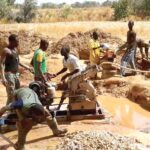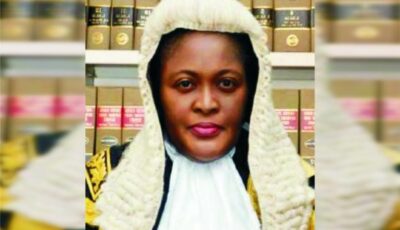Solid mineral in 2020: Artisanal mining, resource control as dominant issues

guardian.ng/business-services
By Kehinde Olatunji31 December 2020 | 4:21 am
One of the events that shaped 2020 in the solid mineral sector is the renewed call for the amendment of the Nigerian Minerals and Mining Act 2007, the Petroleum Act and related laws guiding natural resources management.
This is as stakeholders alleged double standard by the federal government.
The demand for resource control was rife, as individuals and interest groups in the Niger Delta wanted an arrangement where the oil-producing states in the region would be allowed to exploit their resources and pay taxes to the central government.
They claimed such an arrangement was most equitable, as the Federal Government seems to have given tacit approval to some states in the north to manage their mineral deposits.
Anger started building when the Federal Government launched the Presidential Artisanal Gold Mining Development Initiative (PAGMI) in Yauri Local Government Area of Kebbi State.
This was to formalise and integrate the artisanal and small-scale gold mining activities into the nation’s legal, economic and institutional frameworks.
At the flag-off, Executive Governor of Kebbi State, Abubakar Bagudu, who is also PAGMI Vice Chairman, said President Muhammadu Buhari was intensifying efforts to build the capacity of the artisanal miners to enable them to contribute positively, legally and safely to the economy of the country.
“PAGMI is an artisanal support programme for miners of gold in Nigeria with Kebbi and Osun states serving as pilot states,” he said.
According to the government, PAGMI was designed to ensure safer and more efficient mining and processing technologies across artisanal mining locations in Nigeria. With Kebbi and Osun as the pilot states, it said Kaduna, Zamfara, and Niger states would be added to the list soon.
PAGMI buys gold produced by miners and aggregated by licensed buying centres and aggregators after which it supplies to the Central Bank of Nigeria (CBN).
Seeing the Zamfara gold misadventure as a breach of the 1999 Constitution, a lawyer, Joseph Onu Silas, had petitioned the CBN, seeking cancelation of the purchase of gold worth N5 billion from Zamfara State Government while describing the transaction as illegal.
In the letter addressed to the CBN governor, Godwin Omiefele, Silas cited provisions of the Nigerian Minerals and Mining Act, 2007 that lucidly states in section 1(1) and (2) that all mineral resources in, under or upon any land in Nigeria, its contiguous continental shelf and all rivers, streams and watercourses throughout Nigeria, any area covered by its territorial waters or constituency and exclusive economic zones is and shall be vested in the government of the federation for and on behalf of the people of Nigeria.
However, Special Adviser to Governor Bello Matawalle on Media, Alhaji Zailani Baffa, denied the claims that the CBN is trading in gold with Zamfara State Government.
Responding to Joseph Onu Silas, Baffa said CBN did not enter into any trade agreement with the state government as claimed by the lawyer.
He said, “The fact is that the CBN, like in agriculture, is willing to invest in mining, as part of its Anchor Borrowers’ Programme whereby the apex bank invests an amount for the state government to supply it with the gold as proceeds of the investment. This is aimed at boosting the mining sector in the country which is within the provisions of the scheme.”
Baffa further explained: “The state government is not directly mining the gold by itself. It will rather purchase the gold from the mining companies registered by the Federal Government in the state.
“All Nigerians are aware that the Federal Government is in the process of re-registering qualified companies allowed to mine mineral resources in the state on its behalf, just as obtains in the oil sector, which Silas mentioned.”
The Minister of Mines and Steel Development, Olamilekan Adegbite, while speaking on what the ministry was doing to ensure true federalism in exploration of mineral resources said: “The first thing I ask a state government is do you benefit from the oil and gas proceeds? Oil and gas are also mining because you dig into the ground and look for resources to mine. One is solid while the other is liquid.
“We have all partaken in the lunch of our brothers in the Niger Delta. Now that our mother has cooked, we now say everybody should go to their tent. It is unfair; true federalism cannot happen that way.”
In a chat with The Guardian, Head, Department of History, Obafemi Awolowo University, Ile-Ife Dr. Tunji Ogunyemi, urged the oil-producing states to take a cue from Zamfara State and get a license from the Federal Government to exploit oil.
He added that it was lazy of oil-producing states to kick against the gold mining programme of Zamfara State, saying that they could also form a company to secure an oil exploitation license.
“There is nothing that stops the Rivers State Government from incorporating a company and then bidding for an oil well. What stops them? It is just laziness. Do you know that Osun State has a license to mine gold in Ilesha and has firmed out its license to different Chinese companies?
“Nobody can stop Osun from exploiting gold. This is because it has a license. Why have Cross River, Delta and Edo states not formed a company and bid for oil wells to create jobs for their citizens?
“Its high time the state governments began to put their acts together and constitute companies in the pursuit of licenses from the Federal Government for the good of their people.
“People like distributive and not contributory federalism; they have not put their thinking caps on to be able to get licenses
“If people in Zamfara have thought it good and expedient to get a mining licence for their good, why should you say they do not have the right to mine the gold in their domain.”
Also, a lecturer at School of Communication, Lagos State University, Dr. Tunde Akanni, stated that states are free to establish companies that could be used to operate in different sectors of the economy.








